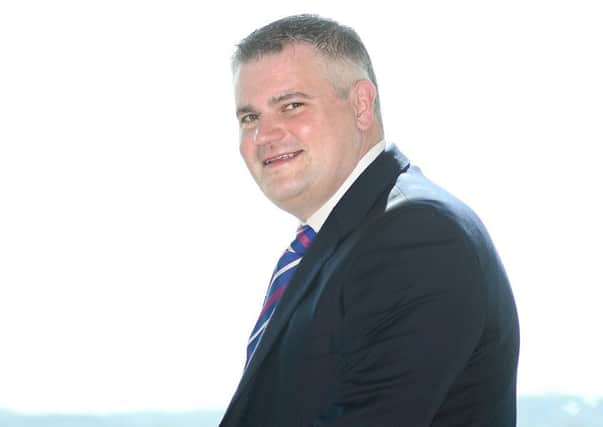Profile: Danny Longbottom


SHE may have been surprised to learn that she is the inspiration behind the leadership of a multi-billion pound business. But Danny Longbottom’s late grandmother is at the forefront of his mind, he says, in a role which could otherwise be perceived as faceless and insincere.
“She always saw the best in every single person she met and would never criticise anybody and I’ve always had a deep-rooted reference point with that,” says the managing director of BT’s UK SME business.
Advertisement
Hide AdAdvertisement
Hide Ad“It’s important sometimes to try and see the quality that people have and how best to use that quality.
“I’ve been very fortunate to work with some really inspirational people and now I feel what I’m here to do is to be one of those inspirational leaders.”
Longbottom is under pressure to deliver £4m of business for BT on a daily basis but he believes that being respectful to staff and colleagues is paramount, something that is lost on some senior managers of large corporations.
“Part of my success as I see it is that I’m still grounded in some very specific values. Integrity means a lot to me.”
Advertisement
Hide AdAdvertisement
Hide AdLongbottom, 40, oversees a £1.3bn turnover business within BT, which provides IT and telecoms to almost a million customers across the UK and employs more than 2,300 people both directly and through third party channels.
The division, which serves small and medium-sized businesses with up to 300 employees, was created during a restructuring process last October following the departure of BT’s group chief executive Ian Livingstone.
BT has launched a new offensive on the mobile market to try to reduce its exposure and dependence upon traditional fixed line telecommunications and is rolling out a number of new products and services.
It recently launched BT One Phone, a unified communications solution, which has all the features of an office phone on a mobile, with all fixed, mobile and extension calls routed to the user’s handset.
Advertisement
Hide AdAdvertisement
Hide AdIt is also improving its mobile internet coverage with the launch of new mobile plans for SMEs that provide access to 4G and over five million Wi-Fi hotspots following an agreement with network provider EE.
“We, like everybody, recognise that SMEs are going to be at the forefront of the economic recovery,” Longbottom says. “We see an opportunity to have the broadest product and portfolio range for customers.”
BT has tried before to combine mobile services with its strength in fixed line communications. BT Fusion was introduced in 2005 and scrapped in 2009 after failing to take off. It used the Vodafone network outside and connected to a BT router at home.
However, analysts believe that the company’s latest unified communications solution is more flexible and scalable.
Advertisement
Hide AdAdvertisement
Hide AdAccording to Longbottom, the biggest challenge for a company of BT’s size and scale is competing with niche companies as it tries to service the whole of the UK.
But by working with selected partners, such as EE, it hopes to deliver the best of what’s available in the market to its customers.
“We can’t be at the forefront of everything,” he says. “But we want to be close enough to technology to not be behind. We want to continue to use the unrivalled network and infrastructure that BT has and either build or partner with the right organisations to deliver products in a way that means our customers can buy from one provider but get the best of what’s in the market.”
Next on the agenda is BT’s tie-up with US firm RingCentral, provider of cloud-based unified communications solutions, another variant of BT One Phone for its business customers.
Advertisement
Hide AdAdvertisement
Hide Ad“Creating and delivering these types of hosted solutions means that you’ve got a virtual PBX (a system that connects telephone extensions of a company to outside public telephone network and mobile networks) in the cloud,” Longbottom says.
BT is also about to relaunch its broadband portfolio and is committed to rolling out its superfast fibre broadband across the country.
According to Longbottom, BT is seeing growth across all sectors but particularly micro-businesses and start-ups.
The firm has joined forces with Enterprise Nation and Microsoft on a campaign to encourage SMEs to get online. According to research, 50 per cent of SMEs don’t have a website and of those that do, customers are only able to buy on 20 per cent of them. “Technology is enabling SMEs to compete with larger businesses both nationally and internationally so we see that as a big opportunity,” says Longbottom. “Work isn’t about going to the office for many small businesses and technology has a big role to play in their connectivity.”
Advertisement
Hide AdAdvertisement
Hide AdTechnology has been a passion for Longbottom, who was brought up in Wakefield, since he started working in an O2 call centre in 1996. He left school after his A-levels and worked in retail before moving to O2 where he worked his way up to project manager.
He went on to hold a number of commercial roles within the gas and electricity sectors with Amerada Hess and TXU Energy.
He joined BT about 10 years ago where his roles have included account director, general manager of service for BT’s SME and Mid-Market channels and, more recently, director of the SME sales channels.
Longbottom, who lives in Skewsby, North Yorkshire, with his wife, Claire, and two sons, Oliver, 14, and Charlie, 12, spends three days a week working in London and the rest of the time visiting sites and customers.
He also runs BT’s Local Business channel, a network of 40 independent BT businesses across the UK.